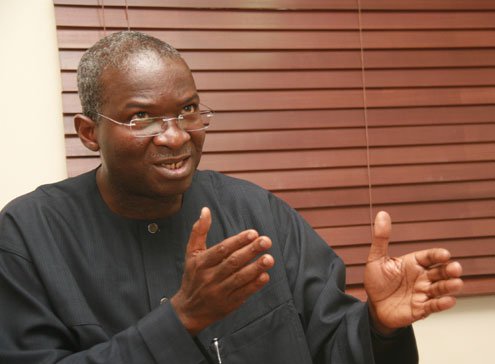This post has already been read 2366 times!
Two decades ago Babatunde Raji Fashola had yet to become the big name he is today – he was only a legal practitioner on the cusp of becoming a Senior Advocate of Nigeria (SAN). Then, in 2002, he was appointed Chief of Staff by the then Governor Bola Ahmed Tinubu of Lagos State. Two years later, he became the first member of his Law School set of 1988 to become a Senior Advocate of Nigeria (SAN).
Fashola handled his role as Chief of Staff remarkably well. But even with such high approvals within Alausa, the State’s seat of power, the idea that he could run for governor of Lagos state seemed at first far-fetched. But in hindsight Mr Fashola’s star power makes it seem foolish to have ever doubted the possibility. In 2007, he contested and was easily elected Governor of Lagos state. Four years later, he won re-election with a resounding 81% of the vote.
Now, in 2020, as Fashola continues in his current position as Federal Minister of Works and Housing, he appears to have preserved the tools that served him well as the governor of Lagos. One of those who should know is Dr Tunji Olowolafe, a Lagos based businessman and industrialist whose developmental projects in the state dates back decades.
As it is common in politics all over the world, speculations filled the air over then-Governor Babatunde Raji Fashola’s second term ambition in 2011. But what finally put the proliferating conjectures to a final rest was one of the most profound endorsements in Nigeria’s political history.
It was at the Action Congress of Nigeria (ACN), now All Progressive’s Congress (APC), secretariat in Ikeja, Lagos, before thousands of the party’s stakeholders and supporters, that Fashola’s predecessor, Asiwaju Bola Ahmed Tinubu, raised Fashola’s hand high up in the air like a victorious athlete and said the magic words: “In agreement with all our party leaders throughout the state and at the national level, I am announcing to you, the final endorsement of Babatunde Raji Fashola for the 2011 election.”
In his 8-year tenure as governor of Lagos state, Mr Fashola attempted to organize a metropolis that was beginning to burst at its seams. It could be said that he succeeded to bring a certain level of order to the chaos that Lagos was popular for. When the phrase mega-city is uttered today around Nigeria, Lagos comes to mind. Beyond the country, the State started to appear in high-level conversations, not just as a constituent member of the Nigerian federation, but as a virile economy with aspirations, potential, and capacity to stand shoulder to shoulder with some of the world’s emergent countries.
As Tayo Ogunbiyi wrote in his piece, In Praise of Babatunde Fashola for ThisDay newspaper, “BRF is, without a doubt, a go-getter and a visionary man… Fashola’s dream of a new Lagos transcends the present. He wanted to build a Lagos that is similar to reputable international cities like London, Mumbai, Istanbul, Sao Paulo, Jakarta, Delhi, Bangkok, and Cairo among others. His government worked with the Organized Private Sector (OPS) to realise the $1.5 Billion Lagos Energy Project as well as the audacious $3.5 Billion Atlantic City Project.”
Certainly, Mr Fashola was simply doing his job as governor to garner such praises but his stellar performance as governor was remarkably rare compared to several of his peers at the time. Under his leadership, Lagos had a GDP of $43 Billion that would make the state – at that time – the fifth biggest economy in sub-Saharan Africa if it were a country. He succeeded in transforming one of Africa’s largest cities by population, cleaning up its streets and fighting corruption in the civil service. For his surgical efficiency, he rose to near-celebrity status among Lagosians.
Yet he never stops.
Upon completing his two terms as governor of Lagos state, uncertainty found Mr Fashola again as many wondered what the next turn was for this impressive political leader. Not a few wondered if it might serve the country well in 2015 should Fashola consider the presidency of Nigeria.
However, in acknowledgement of his outstanding performance as governor of Lagos state, leading several infrastructural development projects, the eventual candidate of the APC, Fashola’s party, and winner of the 2015 elections, President Muhammadu Buhari, appointed Mr Fashola the Minister of Power, Works and Housing in 2015. When Buhari returned for a second term in 2019, he brought Fashola back to his cabinet, now as the Minister of Works and Housing in 2019, a role he holds till date. Nigerians have continually commended the president for this reappointment.
Perhaps the greatest hallmark of Mr Fashola’s journey so far is a combination of a steady hand, an unfaltering commitment to his assignments, and an impeachable character. Men like Fashola are uncommon in politics; it is why everyday Nigerians keep bringing up his name when it comes to the country’s future.
As Olowolafe added, “BRF has to be a shining light for Nigeria’s youth generation. There is indeed a lot to be learnt from his assiduousness.”



